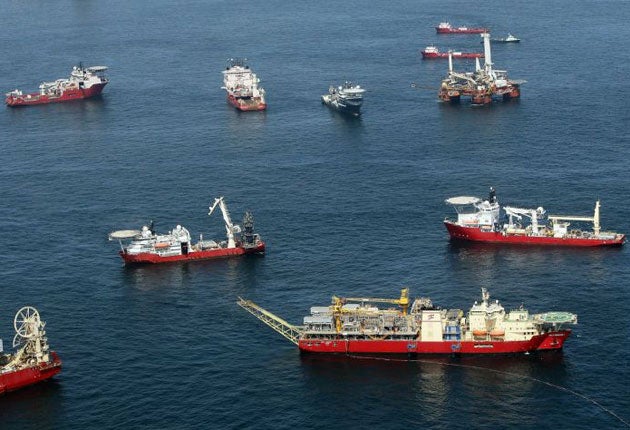Cap remains as tests check for new oil leaks

A cap on BP's ruptured well in the Gulf of Mexico remained in place today while further tests are carried out to check for new leaks.
The discovery of oil seeping near the surface and a possible leak of methane gas raised fears that oil would need to be piped to the surface in order to ease pressure on the well.
The US government yesterday ordered BP to submit a plan to reopen the capped well but later gave it an extra 24 hours to step up monitoring.
The reopening of the cap would require up to three more days of oil spilling into the Gulf.
BP is hopeful the cap, which was put in place last Thursday, will remain in place while relief wells are drilled miles beneath the seabed in order to provide a permanent means of sealing and isolating the damaged well. The first of the relief wells is expected to be completed by the first half of August.
BP shares were almost 5% lower at 388p today as investors reacted to the latest developments in the crisis, which began when the Deepwater Horizon rig exploded on April 20, killing 11 workers.
Shares dipped below 300p at one stage last month - the lowest point since August 1996 - but have recovered to around 425p on signs that it is closer to blocking the well, which BP said today has now cost four billion US dollars (£2.6 billion) in spillage and clean-up.
Retired Coast Guard Admiral Thad Allen, who is in charge of the oil clean-up, told BP yesterday that it should step up monitoring of the ocean floor.
In a letter to BP managing director Bob Dudley, he said: "When seeps are detected, you are directed to marshal resources, quickly investigate, and report findings to the government in no more than four hours.
"I direct you to provide me a written procedure for opening the choke valve as quickly as possible without damaging the well should hydrocarbon seepage near the well head be confirmed."
Meanwhile, directors at the beleaguered oil group are understood to have held discussions with its major shareholders over restructuring the company following the crisis.
Options under consideration are thought to include splitting up the group by selling off its refineries and petrol stations, scaling back its US operations and doing more engineering in-house rather than outsourcing it.
The restructuring will come on top of the sale of around 10% of the group's assets, which will be needed to meet the cost of the oil spill.
Discussions with shareholders are said to be at an early stage, but they will be used to help decide the direction of a formal strategic review, which is expected to be launched by the group's chairman Carl-Henric Svanberg once the ruptured well is finally sealed.
It is thought the restructuring of BP could leave it a significantly smaller firm, which would focus on exploration in emerging oil regions such as West Africa and Brazil, and lead to it selling off its less profitable downstream arm.
The downstream business, which is made up of petrol stations and refineries, employs around 51,600 people - more than half of BP's 80,300 workforce - but accounts for just 3% of the company's pre-tax profit.
BP said last month that it was making a £13 billion fund available to compensate people affected by the Gulf of Mexico oil spill.
Subscribe to Independent Premium to bookmark this article
Want to bookmark your favourite articles and stories to read or reference later? Start your Independent Premium subscription today.

Join our commenting forum
Join thought-provoking conversations, follow other Independent readers and see their replies